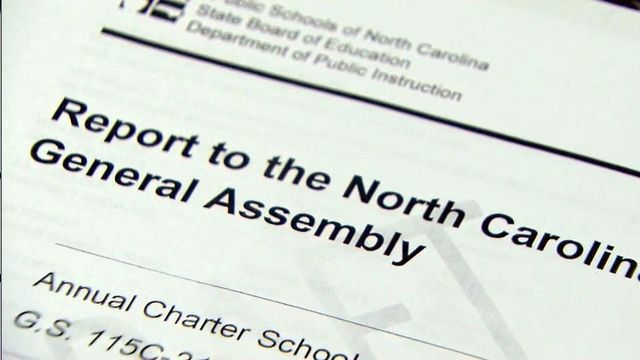'More fair' report on NC charter schools released
State education officials on Thursday released a revised report on North Carolina charter schools, three weeks after Lt. Gov. Dan Forest criticized the original report as "too negative."
Posted — UpdatedThe State Board of Education was to have approved the annual report on Jan. 7 and send it on to state lawmakers. But Forest, who sits on the education board, demanded changes that would highlight the accomplishments of charters and put the data in better context.
Office of Charter Schools director Adam Levinson, who wrote the original report, made the requested changes, but he said the data in it hasn't changed.
"We added maybe some additional figures, additional explanation," Levinson said. "It was simply a way to enhance the recognition of some of the accomplishments of charter schools this year. All of the accomplishments that are listed are just facts, as the rest of the report is facts."
The report still shows that charter school students are more likely to be white and less likely to be economically disadvantaged than their traditional school counterparts.
Darrell Allison, president of Parents for Educational Freedom in North Carolina, said that fact is simply a reflection of which families are applying to charters. Almost all charters use blind lotteries to select their students, he noted.
"Public charter schools cannot discriminate," Allison said. "Unlike traditional public schools, they cannot zone kids to come up with the right racial equation."
After some charters designed to target disadvantaged students showed success, for example, they were flooded with applications from families that didn't fit that initial profile, he said.
Allison says charters need more flexibility to use weighted lotteries, which would help them ensure they're serving minority and low-income students.
But Matt Ellinwood, a policy analyst with the left-leaning North Carolina Justice Center, said the problem is access. Charters don't have to provide transportation or subsidized lunches, which he said could keep some low-income families from even applying.
"That's been the theme for a long time that we need to have these schools provide those two things so that they can be accessible, and I think this report really highlights that," Ellinwood said.
Forest said the revised report, which will go before the State Board of Education next week, "presents a much more fair picture of the status of public charter schools in North Carolina by including more data and necessary qualifications."
"I think this report, instead of being so black and white, if you will, adds a little bit of color and gets a little bit deeper in terms of analysis of what really is happening in these charter schools," Allison said. "We want to make sure that we have accurate analysis – a good viewpoint – so we can make some good decisions. We want to accelerate where we see good work happening, and we want to close some operations down when it’s not being of service to our students."
• Credits
Copyright 2024 by Capitol Broadcasting Company. All rights reserved. This material may not be published, broadcast, rewritten or redistributed.





